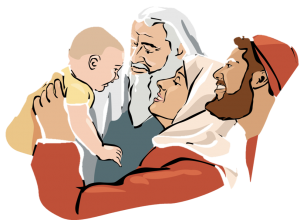EXODUS 13 – MISGUIDED DEDICATION
When I originally put pen to paper on this topic of Misguided Dedication, I was in a car heading south to a church who were looking at the topic of outward-responsible spirituality. Gazing from my window in 21st Century Britain, it’s difficult to argue that details within an event that happened almost four millenniums ago, could be at all important for us today. However, if I were to encourage you in “outward-responsible spirituality”, I would have to address the issue of inward looking, me and mine misguided “warm-fuzzy concepts” that surround the modern Believer’s dedication of our children to their Creator God.
 Going back in time to the Hebrew understanding – and like Mary and Joseph who dedicated Jesus according to the Law of Moses[a] – we had also gone through the formal process of dedicating our only son. Today, people call it Christening, or “Naming Day”, or Dedication. Still, the idea today includes accessing the riches of the Creator God, like banking a blank cheque. There’s an idea of the child’s design-potential realized in this life, and their “prophetic” destiny based on their name meaning. Still other ideas include a ticket into Heaven by getting the child’s name registered in the Creator God’s Book of Life.[b] All these are added to protection, health, and any other common fallacy that’s packaged in our understanding of “blessing”. We want to hand over our child into the loving care of its Creator and this firmly based on our idea of ‘loving’ and ‘care’.
Going back in time to the Hebrew understanding – and like Mary and Joseph who dedicated Jesus according to the Law of Moses[a] – we had also gone through the formal process of dedicating our only son. Today, people call it Christening, or “Naming Day”, or Dedication. Still, the idea today includes accessing the riches of the Creator God, like banking a blank cheque. There’s an idea of the child’s design-potential realized in this life, and their “prophetic” destiny based on their name meaning. Still other ideas include a ticket into Heaven by getting the child’s name registered in the Creator God’s Book of Life.[b] All these are added to protection, health, and any other common fallacy that’s packaged in our understanding of “blessing”. We want to hand over our child into the loving care of its Creator and this firmly based on our idea of ‘loving’ and ‘care’.
 Our son’s Dedication became even more special for us, when Mikey returned to his first “home” as a young lad, to serve as a deckhand for six month on that ship’s last tour of duty through the Caribbean. Amazingly, the couple who had performed his Dedication were now Directors on board Logos II for that time. And, because Mike was not yet eighteen, they had agreed to be Mike’s “parents” for us during that time.
Our son’s Dedication became even more special for us, when Mikey returned to his first “home” as a young lad, to serve as a deckhand for six month on that ship’s last tour of duty through the Caribbean. Amazingly, the couple who had performed his Dedication were now Directors on board Logos II for that time. And, because Mike was not yet eighteen, they had agreed to be Mike’s “parents” for us during that time.
As with many things in life, I now know that when it comes to allowing the Creator God to lead, my woolly ideas (based on my own definition of “dedication”) were misguided. For one thing, when Mary and Joseph brought Jesus into the Temple courts to be dedicated, the prophecy over Him included a sword that would piece Mary’s soul.[c] But if this is the case, why would anyone want to trust their children into the hands of the Creator God?
Well… I think the answer isn’t found in our religious traditions that may have skewed our understanding over time, but in today’s chapter…
“On that day tell your son, ‘I do this because of what the Lord did for me when I came out of Egypt.’” [v8]
Whatever I do for our Maker today, it shouldn’t be about a warm-fuzzy feeling about a preferred future. Instead, it should be firmly based on what my Maker has already done for me in the past. For example, long before my son was born, my Maker brought me out of my own personal slavery to sin by His Mighty Hand. [v3] He redeemed my life and He led me on a journey with Him for more than five decades. Although this wilderness journey through life on planet earth has included many bumps, it has also been and will be in the future, flowing with milk and honey. [v5]
 It’s because of this future hope in my Maker’s epic storyline, that I wanted not just to consecrate my heir to Him [v1], but all my children into His hands in the original Hebrew understanding – such that they are irrevocably handed over, so that what is dedicated, belongs to God. It seems logical to me to give them a sure and certain future in their Maker’s hands. It is surely only logical that without belonging to their Maker, there’s little chance of them getting into their Maker’s Kingdom – a Kingdom flowing with milk and honey that is set ahead of us in our future.[d]
It’s because of this future hope in my Maker’s epic storyline, that I wanted not just to consecrate my heir to Him [v1], but all my children into His hands in the original Hebrew understanding – such that they are irrevocably handed over, so that what is dedicated, belongs to God. It seems logical to me to give them a sure and certain future in their Maker’s hands. It is surely only logical that without belonging to their Maker, there’s little chance of them getting into their Maker’s Kingdom – a Kingdom flowing with milk and honey that is set ahead of us in our future.[d]
But there are three parties involved in a dedication ceremony. While the above is my hope for my children, their Maker assigns outwardly-responsibly spirituality to them. Their own freewill choices (given in their original design as human images of God) are paramount for affecting their destiny. Likewise, the Creator God’s choice over their future is fundamentally important.[e] I had to submit, for example, to the Creator God’s choices over the destiny of our son, when He took Mike from us and we experienced first-hand the same sword that had once pierced Mary’s soul. So, at a time when bitter grief set in (like a sort of unforeseen Black Swan that flew in and settled unexpectedly in the dark), we could feel well within our rights to reject the Creator God after our child died. But it was precisely in that moment that we needed to revisit our act of dedication, and the implications of someone “belonging” to Him. [v12]
I don’t know why. And I don’t know many things that are written into the Hebrew script. For example, I don’t know why in today’s chapter the Lord commanded Moses to tell the people to redeem a first-born donkey with a lamb; but if one is not available, to break its neck. [v13] I have an idea based on what I now know of the human abuse of donkeys, but I could be wrong. Nor do I know why Father God’s new family couldn’t eat bread cooked with yeast over these specific dates each year. [v6-7] From an onlooker’s 21st century perspective, this topic seemed to be woven randomly into the storyline. But the Great Playwright was clear on the matter, and mentioned it four times in the past two chapters. I can only go by what I know of the Creator God who is clear, all-knowing, planed, incredibly protective of His family, a good shepherd and teacher for training human images of Himself on how to live in His own likeness. Therefore, I imagine that like yeast in dough, it could have represented an outward sign: a choice to rid the community of any form of cultivated “spiritual bacteria” that would spread through the whole camp.[f] This and many questions will no doubt be answered in the Kingdom of God.
But thinking upon the void that’s caused by a continual lack of understanding, has made me realize that if our Infinite Creator God were a diamond, He would have in excess of 8 billion facets.  Each facet currently reflects information that is stored in one of 8 billion human images of Him[g] who are currently living on the planet today. If each facet reflects knowledge of what their Maker’s Word means to them (the portion of knowledge that can only be gleaned by closely examining that particular image-reflection), we are likely to need all 8 billion facets. If we are even to begin obtaining any level of complete understanding of His Handbook for Life, all 8 billion human images of God – to each describe how their Maker’s written Word has reveal Him to them, i!
Each facet currently reflects information that is stored in one of 8 billion human images of Him[g] who are currently living on the planet today. If each facet reflects knowledge of what their Maker’s Word means to them (the portion of knowledge that can only be gleaned by closely examining that particular image-reflection), we are likely to need all 8 billion facets. If we are even to begin obtaining any level of complete understanding of His Handbook for Life, all 8 billion human images of God – to each describe how their Maker’s written Word has reveal Him to them, i!
The yeast and the bread in today’s chapter, belongs to an entire side of the diamond – the Hebrew side of our Maker’s refection. Any suggestions that I can give you are likely to come from guessing. But I can draw aside with you today, to talk about the “…sign on your hand and a reminder on your forehead that this law of the Lord is to be on your lips…” [v9,16] This is important because “God’s solid foundation stands firm, sealed with this inscription: ‘The Lord knows those who are his,’ and, ‘Everyone who confesses the Name of the Lord must turn away from wickedness.’”[h]
 While we may think that these stories are simply about the ancient past – relating only to the Jewish people sticking to their laws and regulations, their commemorative days and Jewish traditions – they’re puzzle pieces for us. The script is “prophetic”, which means: God’s word about Himself to the people that He made in His own image to be like Him. But because He transcends time and space, so too is His Word transcendent.
While we may think that these stories are simply about the ancient past – relating only to the Jewish people sticking to their laws and regulations, their commemorative days and Jewish traditions – they’re puzzle pieces for us. The script is “prophetic”, which means: God’s word about Himself to the people that He made in His own image to be like Him. But because He transcends time and space, so too is His Word transcendent.
In other words, the Creator God’s Word isn’t restricted in any way, or limited to the receiver’s age or background. His Word can straddle time and culture so that He relates to any of us today. Our job is to dig through His word, then unpack and sincerely apply (within the context of the whole of His Word) as much as we are faithfully able to do. Therefore, I think it’s worth noting that, in our future, the Creator God will know who is sealed on their forehead as “servants of our God”[i], and which people don’t have any sign of God on them.[j]
I want to be sealed because the script shows that the alternative is dire! But this seal doesn’t come from a priest with “holy water” at a modern dedication ceremony. Instead the seal on my forehead, and the forehead of my children, is the same “sign” that’s mentioned in today’s chapter i.e. a reminder that the ordinances of the Lord is to be on my lips. And why would I have His ordinances of my lips? Well, it’s because He brought me out of my own private slavery by His Mighty Hand. [v9]
 When I speak here of His Mighty Hand, I’m speaking of a person – His Right-Hand Man. Each time this epic storyline mentions the Creator’s right hand and outstretched arm, He’s talking about a person. But this is a gemstone woven into the fabric of the storyline that we’ll pick up on tomorrow. Suffice to say that, far from misguided dedication, I’ve no hope of being rescued or “redeemed”, without His Right Hand reaching out, by my Maker’s Will, to save me.
When I speak here of His Mighty Hand, I’m speaking of a person – His Right-Hand Man. Each time this epic storyline mentions the Creator’s right hand and outstretched arm, He’s talking about a person. But this is a gemstone woven into the fabric of the storyline that we’ll pick up on tomorrow. Suffice to say that, far from misguided dedication, I’ve no hope of being rescued or “redeemed”, without His Right Hand reaching out, by my Maker’s Will, to save me.
Whatever is happening in this chapter, it isn’t about acts of revenge on Ancient Egypt. [15a] It’s about becoming an over-night family where the heirs are adopted, thereby simultaneously placing the “fortunes” of an entire population into the hands of the Creator. Signing over their heirs to Him means putting the inheritance into the hands of the Creator God as well. He holds everything in His hands.
Today’s chapter is, therefore, part a bigger picture. It’s the result of Abraham’s global promise that the Creator God swore on oath centuries earlier. [v5,11&19] The oath was not just related to redeeming a family for Himself, it’s also about a righteous Creator putting a stop to several nations of people who had been given centuries to change their ways.[k] The people groups listed in today’s chapter [v5,11&17] were neighbouring nations who surrounded the cities of Sodom and Gomorrah.[l] They were infected with the same ‘sin virus’ as the men of Sodom. And, even though they’d seen such a horrific destruction of the cities of the plain, their bad behaviour had, by now, escalated to a peak.[m]
But as today’s chapter comes to an end, three things are important for me to close. In extreme crisis, Father God protects His people from further fear. [v17-18] He knows our limits[n] and He shields us – just as He told Abraham, their patriarch, six centuries earlier:
“Do not be afraid… I am your shield, your very great reward.” [Genesis 15:1]
Secondly, the story ended up just a Joseph had predicted it would, four centuries earlier. [v19] So no matter how long it takes, we can be sure that the Creator God will fulfil His own script and make all His promises come true – just as He foretold in His word.
And finally, when it comes to the topic of misguided dedication, one thing I’ve found sure: His word has been, and still is, a lamp for my feet,  light for my path.[o] My experience, and HIStory, have both proven that He who watches over me neither sleeps nor slumbers.[p] In my long journey, over rough and smooth, I’ve experienced my Maker faithfully leading me through my daylight hours and through the darkest hours of my night. [v21-22]
light for my path.[o] My experience, and HIStory, have both proven that He who watches over me neither sleeps nor slumbers.[p] In my long journey, over rough and smooth, I’ve experienced my Maker faithfully leading me through my daylight hours and through the darkest hours of my night. [v21-22]
CLICK to return to today’s “Daily Breadcrumbs”
[a] Luke 2:22-40
[b] Daniel 7:10; Psalm 69:28; Revelation 20:12
[c] Luke 2:35
[d] Matthew 25:31-34
[e] Matthew 22:14 (Context v1-14)
[f] Matthew 13:33; 16:5-12
[g] Genesis 1:26-27
[h] 2 Timothy 2:19
[i] Revelation 7:3
[j] Revelation 9:4
[k] Genesis 15:5,12-19
[l] Genesis c18-c19
[m] Genesis 15:16
[n] 1 Corinthians 10:13
[o] Psalm 119:105
[p] Psalm 121:4